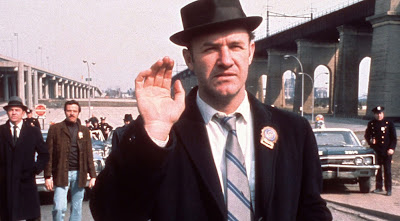 |
| Popeye Doyle saying "Bonjour!" |
Like any overexploited genre, the cop film quickly became played out, and although the 1980s saw them continue to fill screens, the emphasis switched to comedy, over-the-top action and a glossy visual style that was miles from noir. The Last Action Hero (1993) starring Arnold Schwarzenegger was a broad parody of cop films, and it effectively announced the end of cop noir as a mainstream genre. At least on this side of the Atlantic.
Cop noir appears to be alive and well in France. Like the American films of the '70s, Gallic cop films take a gritty, uncompromising view of les flics operating in an environment of corruption, compromise, debilitating (from a cop point of view) legal restrictions, and powerful criminal gangs. Paris the City of Light is absent from this genre. The cops' field of operations is usually the sprawling banlieues that ring Paris, filled with drab, decaying apartment blocks controlled by gangs of African and North African descent who appear to operate as an occupying army. The Eiffel Tower might make a cameo appearance as a distant spike on the horizon, but otherwise things feel very American: the music is rap, the cops and robbers nosh pizza and burgers, and everyone seems to drive outsized SUVs. No baguettes or jaunty accordion music.
Two of the best examples of this French sub-genre are from TV. Spiral (the French title is Engrenages) ran for eight seasons over 15 years starting in 2005. It has a large cast of cops and lawyers, and covers every conceivable kind of serious crime, from the initial police investigation to the politics of the French legal system. I'm making it sound dry, but it's filled with twists and turns, fraught personal and professional relationships, cliffhangers, and lots of suspect-slapping, but surprisingly little gunplay. It sometimes gets a bit melodramatic, but it's unrelentingly tense and enormously entertaining. Braquo ran for four seasons and is straight-up bonkers. It follows four members of a Paris investigative squad who, in each season, go from the frying pan to the fire to quicksand to a crocodile pit and back to the frying pan. The plotting stress-tests credulity, but the action is plentiful and so is the body count.
On the film side, some of the better examples include 36 Quai des Orfevres, Les Miserables, Bac Nord, Rogue City, Lost Bullet, and Close Enemies. And here's some of their common tropes: displays of macho posturing that would make professional wrestlers blush; lots and lots of cigarettes; riots and near-riots whenever cops enter a banlieue; cops strongarming or blackmailing prosecutors; and at least one scene set in a frantic, strobe-lit nightclub that features a beating and/or killing in a washroom. A rather surprising one is that cops in these shows and movies are almost all white. The French police, like their American cousins, have a reputation for racism, but that issue doesn't come up as often as one would think in these films. The lack of minorities in cop roles undoubtedly reflects reality, but it's jarring compared to contemporary American films and shows which like to present racially diverse cop shops.
So if you pine for the aesthetic of '70s cops films, with their grimy settings and tough, toxic cops, rest assured that the French are keeping the genre alive and ass-kicking. The French connection lives on, literally.
No comments:
Post a Comment